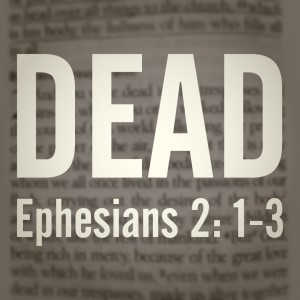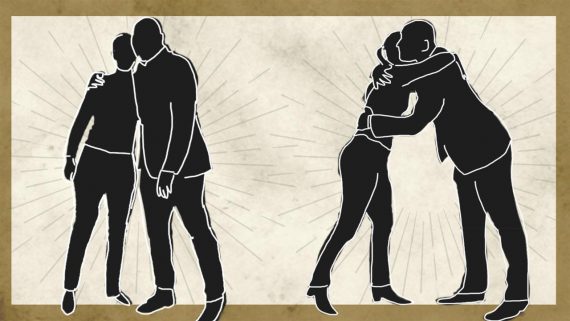Ephesians 2:1 is a favorite passage among some theologians to defend the idea that unregenerate people cannot do anything in their life to move toward God.
In other words, some say that because people are “dead in the trespasses and sins” (shortened as “dead in sins“) they cannot do anything good, including believe in Jesus.
But is this what Ephesians 2:1 is teaching? The verse says this:
Ephesians 2:1. And you He made alive, who were dead in trespasses and sins.

Is Paul Teaching that Unbelievers cannot Believe in Jesus?
So is Paul teaching in Ephesians 2:1 that unbelievers cannot even believe in Jesus for eternal life unless God first regenerates them? Must God give unbelievers “new life” (regeneration) before they believe and so that they can believe?
Do people receive eternal life from God before they believe in Jesus or because they believe in Jesus?
The answer is that Jesus and Paul and all Scripture consistently agrees that we believe in in Jesus for eternal life; we do not receive eternal life to believe in Jesus (John 3:16; 5:24; 6:47; Rom 4:4-5).
Since Faith is not a Work, Unbelievers are Able to Believe
The idea that unregenerate people cannot do anything good is silly. Unbelievers can do all sorts of good spiritual things, which includes believing in Jesus for eternal life (cf. John 5:25; 20:31; Rom 1:20; Gal 3:26; Col 2:12-13; 1 Pet 1:23-25; Heb 10:39).
But this does not mean that the person who believes in Jesus for eternal life has earned their eternal life, has worked for it, or has done anything good to merit it.
Since faith is not a work, but is the opposite of works (Romans 4:4-5), then faith is not meritorious.
Those who receive the free gift of eternal life through faith in Jesus do not in any way get “credit” for eternal life.
Faith is the persuasion that something is true, and when God persuades us that we can have eternal life through Jesus Christ alone, at that moment of faith we have received eternal life from Him (see the Gospel Dictionary entry on Faith).
When we believe, no works are performed. No effort is expended.
So what is Paul teaching in Ephesians 2:1?
 This entire line of thought is completely foreign to what Paul had in mind when he wrote Ephesians 2.
This entire line of thought is completely foreign to what Paul had in mind when he wrote Ephesians 2.
The debate about spiritual death and spiritual life in Ephesians 2 has been imported into the passage from outside theological systems that rip various verses in this chapter out of context so that they can then be used as proof texts to defend ideas that are not actually found in Paul’s line of thought.
A couple of factors contribute to the widespread failure to understand Paul’s point in Ephesians 2.
We must understand the word “saved”
The most significant contributing factor to this misunderstanding is the word “saved” in Ephesians 2:8-9.
When most Christians hear the word “saved” or “salvation,” they immediately think of “eternal life,” “going to heaven when you die,” or some similar concept.
But the Bible never uses the word “salvation” or “saved” as an equivalent term for eternal life. Instead, the word “saved” (and the entire “salvation” word family) means “deliverance” or “to be delivered” and the context determines what kind of deliverance is in view (see The Gospel Dictionary entry on Salvation).
To be “saved” in Ephesians 2 is to be “delivered from sin”
When Ephesians 2:8-9 is examined in the broader context (see the first several paragraphs of this post on Ephesians 2:1-3 to see the context of Ephesians 2), we learn that salvation in Ephesians is not about receiving eternal life so you can go to heaven when you die, but is instead about being rescued and delivered from our addiction to accusation, scapegoating, and violence, so that we are brought into the way of life, love, and liberty that God always wanted and desired for humanity.
So what does Ephesians 2:1 mean?
When this point about salvation is grasped, we then see that the phrase “dead in trespasses and sins” in Ephesians 2:1 is not talking about some sort of “spiritual death” in which the unregenerate cannot even respond to God or believe in Jesus.
Instead, the phrase “dead in trespasses and sins” is referring to the pervasive and controlling disease of death which covers the whole earth.
The point Paul is making here is the same exact point made in Genesis 4–6. Sin was introduced to the world, and death came with it, not primarily the death that comes with old age, but the death that comes from human violence against one another.
In Ephesians 2:1-3, Paul is saying that the whole world is addicted to the destructive power of sin, which leads us to scapegoat and kill others, rather than accept, forgive, and love them.
Paul describes this further in Ephesians 2:2-3. In speaking of the course of the world, Paul is saying that sin and death guide and control the world.

Rivalry, scapegoating, and violence form the foundation of all human civilization, culture, and interaction (see the Gospel Dictionary entry on World). This is also what Paul is referring to when he mentions the prince of the power of the air which works in the sons of disobedience.
This is, of course, a reference to Satan, who is the accuser (see the Gospel Dictionary entry on Satan). The desire of sin which God warned Cain against (Gen 4:7) is what Paul describes in Ephesians 2:3.
So the great problem of Ephesians 2:1-3 is indeed sin.
Sin is the realm of death in which all humans live and function. Sin is seen through accusation and scapegoating that comes from the desires and lusts of the flesh. All humans live in this realm and know of no other way to live.
Further Evidence from the context of Ephesians 2:1
Ephesians 2 (the whole chapter) follows a Problem-Solution-Application outline. And to see what the “Problem” of death and sin actually are, we can reverse engineer the chapter by beginning at the end, and seeing how Paul applies the chapter.
And in Ephesians 2:11-22, Paul talks about doing away with hostility and dividing walls of separation that we use to keep human separate from one another and hating one another. Instead, we are called to live in unity, love, and peace, just like Jesus Christ.

So if that is the application, then the problem is the opposite. If peace and the removal of human hostility on this earth is the goal, then the problem is not about how we’re headed for hell and need to go to heaven. No, if the goal is the end of hostility between humans, then the problem is hostility and violence between humans.
And of course, the solution to the problem is what was accomplished in Jesus Christ, which is what Paul discusses in Ephesians 2:4-10.
We can briefly summarize Ephesians 2:1-22 this way:
Since sin and the death that comes from human hostility is the great problem of the world (Ephesians 2:1-3), God took the initiative to send Jesus Christ and show us a way out of this problem (Ephesians 2:4-10), so that those of us who see and understand what Jesus did on the cross, can now live as He lived, in love and unity for one another (Ephesians 2:11-22).
“Dead in Sins” in Ephesians 2:1
So the term “dead in sins” in Ephesians 2:1 is not referring to some sort of “spiritual death” which makes people unable to hear or respond to God, or to believe in Jesus for eternal life.
No, Paul is instead describing human culture and civilization. He is describing the “atmosphere” of sin and death in which we all live, and which we all assume is normal.
 This is what it means to be “dead in sins.” We are surrounded by an atmosphere, a system, a world of sin, which leads to death … death through murder, warfare, hatred, killing, condemning, scapegoating, and all things related to this.
This is what it means to be “dead in sins.” We are surrounded by an atmosphere, a system, a world of sin, which leads to death … death through murder, warfare, hatred, killing, condemning, scapegoating, and all things related to this.
But this way of “life” is not normal, and it is not what God wanted, planned, or intended. This worldly way of life is actually death.
So Jesus came to show us another way to live … an actual way to live. Because of what Jesus showed us, we can now live in a heavenly culture and civilization, even while we are here on earth.
 Understanding the Gospel requires us to properly understand the key words and terms of the Gospel. Take my course, "The Gospel Dictionary" to learn about the 52 key words of the Gospel, and hundreds of Bible passages that use these words.
Understanding the Gospel requires us to properly understand the key words and terms of the Gospel. Take my course, "The Gospel Dictionary" to learn about the 52 key words of the Gospel, and hundreds of Bible passages that use these words.
This course costs $297, but when you join the Discipleship group, you can to take the entire course for free.




 There are five crowns mentioned in Scripture. They are the Everlasting Crown (1 Cor 9:25), the Crown for the One who Wins Souls (Php 4:1; 1 Thess 2:19), the Crown of Righteousness (2 Tim 4:8), the Crown of Glory (1 Pet 5:4), and the Crown of Life (Jas 1:12; Rev 2:10).
There are five crowns mentioned in Scripture. They are the Everlasting Crown (1 Cor 9:25), the Crown for the One who Wins Souls (Php 4:1; 1 Thess 2:19), the Crown of Righteousness (2 Tim 4:8), the Crown of Glory (1 Pet 5:4), and the Crown of Life (Jas 1:12; Rev 2:10). Eternal life is a free gift to everyone and anyone who believes in Jesus for it. You do not have to work your way to eternal life. Eternal life cannot be earned or kept by good works.
Eternal life is a free gift to everyone and anyone who believes in Jesus for it. You do not have to work your way to eternal life. Eternal life cannot be earned or kept by good works. The crown of life that James mentions here is often confused with eternal life.
The crown of life that James mentions here is often confused with eternal life. The crown mentioned in Revelation 2:10 is also the crown of life mentioned in James 1:12. In both cases, the crown of life is a special honor, reward, or recognition given by Jesus to those who stand up against the temptation and trials of the devil.
The crown mentioned in Revelation 2:10 is also the crown of life mentioned in James 1:12. In both cases, the crown of life is a special honor, reward, or recognition given by Jesus to those who stand up against the temptation and trials of the devil.

 The bottom line truth we will learn is that a public confession of Jesus is not required to receive (or prove that we have) eternal life. Not even Romans 10:9-10 teaches this idea.
The bottom line truth we will learn is that a public confession of Jesus is not required to receive (or prove that we have) eternal life. Not even Romans 10:9-10 teaches this idea.

 Many use Romans 10:9-10 to teach that if a person is going to truly be a Christian, they are required to make a public confession of faith in front of other people.
Many use Romans 10:9-10 to teach that if a person is going to truly be a Christian, they are required to make a public confession of faith in front of other people.


 The Book of Life is a translation from the Greek phrase tō biblō tēs zōēs. The phrase “the Book of Life” or “the Book of the Living” are fine translations for this phrase.
The Book of Life is a translation from the Greek phrase tō biblō tēs zōēs. The phrase “the Book of Life” or “the Book of the Living” are fine translations for this phrase. Whichever approach you choose, it is important to note that while Scripture does teach about getting blotted out of the Book of Life, this does not ever refer to losing eternal life. While a person might get their “penciled” name erased from the Book of Life when they die, once a person’s name is written in permanent ink, it cannot ever be blotted out.
Whichever approach you choose, it is important to note that while Scripture does teach about getting blotted out of the Book of Life, this does not ever refer to losing eternal life. While a person might get their “penciled” name erased from the Book of Life when they die, once a person’s name is written in permanent ink, it cannot ever be blotted out. He says he will come like a thief in the night (Rev 3:3), but this does not mean that He will come to kill them or take away their eternal life. Jesus says that unfaithful servants will not be honored the same way that faithful servants will be, but He is not saying that unfaithful servants will be cast out, killed, or have eternal life removed from them.
He says he will come like a thief in the night (Rev 3:3), but this does not mean that He will come to kill them or take away their eternal life. Jesus says that unfaithful servants will not be honored the same way that faithful servants will be, but He is not saying that unfaithful servants will be cast out, killed, or have eternal life removed from them.
 She said, “Look at Paul! He was an apostle. He wrote a large amount of the New Testament. He was the greatest missionary the world has ever seen! But even Paul was afraid that if he sinned, he would go to hell when he died. We should all be concerned about the same thing!”
She said, “Look at Paul! He was an apostle. He wrote a large amount of the New Testament. He was the greatest missionary the world has ever seen! But even Paul was afraid that if he sinned, he would go to hell when he died. We should all be concerned about the same thing!” What is most important is that the word was often used in connection with money. The ancient world did not have paper money, but used coins as currency. The precious metals used for these coins were melted down and poured into molds. Once the metal cooled, the coins would be put into circulation. Some people, however, would shave the edges off these coins so they could take the shavings and make additional coins.
What is most important is that the word was often used in connection with money. The ancient world did not have paper money, but used coins as currency. The precious metals used for these coins were melted down and poured into molds. Once the metal cooled, the coins would be put into circulation. Some people, however, would shave the edges off these coins so they could take the shavings and make additional coins.
